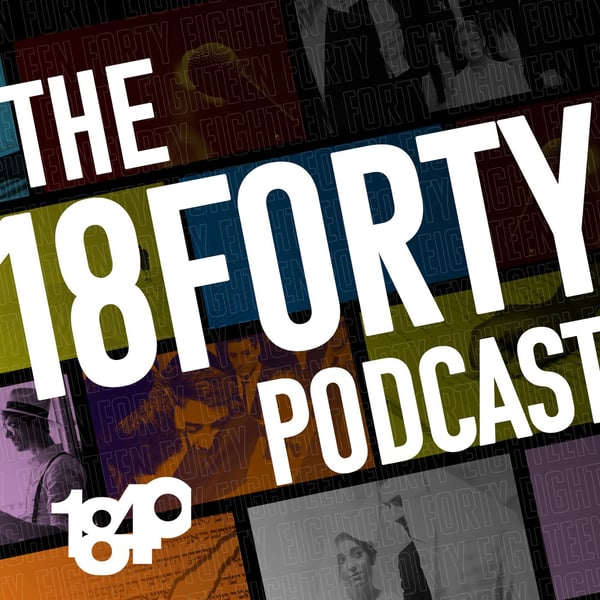Shlomo Brody & Beth Popp: Demystifying Death and the End of Life [Loss 1/3]
18Forty Podcast
18Forty
4.6 • 638 Ratings
🗓️ 15 July 2025
⏱️ 113 minutes
🧾️ Download transcript
Summary
In this episode we discuss:
- How do we connect to eternity within this finite existence?
- What halachic issues must we consider when making end-of-life decisions?
- What happens to the body of someone who’s died?
Tune in to hear a conversation about how we can sanctify life in the face of mortality.
Interview begins at 18:30
Rabbi Dr. Shlomo Brody is the executive director of Ematai and a columnist for The Jerusalem Post. His first book, A Guide to the Complex: Contemporary Halakhic Debates, received a National Jewish Book Award. His newest book, Ethics of Our Fighters: A Jewish View on War and Morality, was published in 2023. A summa cum laude graduate of Harvard College, he received rabbinic ordination from the Israeli Chief Rabbinate, an MA in Jewish philosophy at the Hebrew University, and his PhD from Bar Ilan University Law School.
Dr. Beth Popp is a professor on the faculty of Icahn School of Medicine at Mount Sinai in New York, specializing in Hospice and Palliative Medicine. She has served on hospital ethics committees for most of her career and presents regularly to community groups to clarify the role of hospice and palliative care in the healthcare system. She has been extensively involved in educating rabbinic leaders about the medical aspects of serious illness and end-of-life care.
References:
Rabbi Yitzchak Hutner's Theology of Meaning by Alon Shalev
Pachad Yitzchak al Shavuot by Rabbi Yitzchak Hutner
“Letters of Love and Rebuke From Rav Yitzchok Hutner” by David Bashevkin
Halakhic Man by Rabbi Joseph B. Soloveitchik
Ethics of Our Fighters: A Jewish View on War and Morality by Rabbi Dr. Shlomo Brody
A Guide to the Complex: Contemporary Halakhic Debates by Rabbi Dr. Shlomo Brody
The Immortal Life of Henrietta Lacks by Rebecca Skloot
The Denial of Death by Ernest Becker
Seinfeld: “The Comeback”
Being Mortal by Atul Gawande
Kaddish by Leon Wieseltier
When Breath Becomes Air by Paul Kalanithi
For more 18Forty:
NEWSLETTER: 18forty.org/join
CALL: (212) 582-1840
EMAIL: [email protected]
WEBSITE: 18forty.org
IG: @18forty
X: @18_fortyWhatsApp: join here
Become a supporter of this podcast: https://www.spreaker.com/podcast/18forty-podcast--4344730/support.
Transcript
Click on a timestamp to play from that location
| 0:00.0 | Hi friends and welcome to the 1840 podcast where each month we explore different topic balancing modern sensibilities with traditional sensitivities to give you new approaches to timeless Jewish ideas. |
| 0:20.3 | I'm your host, David Bischofkin, and this month |
| 0:23.6 | we're exploring loss. This podcast is part of a larger exploration of those big, juicy, Jewish |
| 0:30.4 | ideas. So be sure to check out 1840.org, that's 1-8-F-O-R-T-Y.org, where we have a new website that you can check out that |
| 0:39.9 | features all of our videos, articles, recommended readings, and you can sign up for weekly |
| 0:44.5 | emails. |
| 0:46.2 | We have spoken a lot about the revolutions that took place as a part of modernity, which is |
| 0:53.2 | why we are called 1840 after the calendaric year. |
| 0:56.7 | That's normally associated with the advent of the industrial revolution when society began |
| 1:04.5 | to change. |
| 1:05.3 | There is something else that happened during this period, and that is the emergence of like a new articulation |
| 1:12.6 | of what it means and what it feels like to be alive. |
| 1:17.3 | As the Enlightenment swept through Europe and the last vestiges of religious authority |
| 1:23.9 | within government began to decay and slowly disappear. We were kind of left in a |
| 1:31.4 | purely materialistic world. Scientists were now the people who were given and were seen as having |
| 1:37.9 | the most authority for how the world works. Religion was seen, broadly speaking, as a relic of the past, and people were left to find |
| 1:49.4 | a new pathway, a new approach to how to find meaning in their lives. And it was during this period |
| 1:56.5 | where a famous philosopher that I'm sure many of our listeners have heard of named Saurin Kierkegaard. |
| 2:04.0 | Kierkegaard was a Danish theologian and philosopher that had a big influence on really a lot of |
| 2:10.7 | religious thinking because of the way he articulated this very struggle. |
| 2:16.7 | He began publishing in the 1840s, |
| 2:20.0 | and the reason why I've been thinking about him |
... |
Transcript will be available on the free plan in 16 days. Upgrade to see the full transcript now.
Disclaimer: The podcast and artwork embedded on this page are from 18Forty, and are the property of its owner and not affiliated with or endorsed by Tapesearch.
Generated transcripts are the property of 18Forty and are distributed freely under the Fair Use doctrine. Transcripts generated by Tapesearch are not guaranteed to be accurate.
Copyright © Tapesearch 2025.

